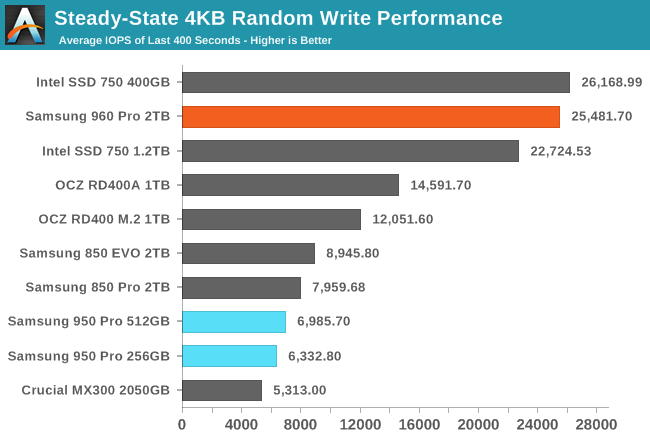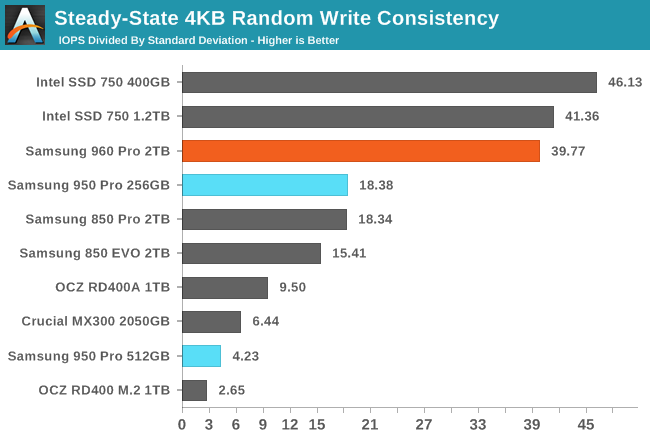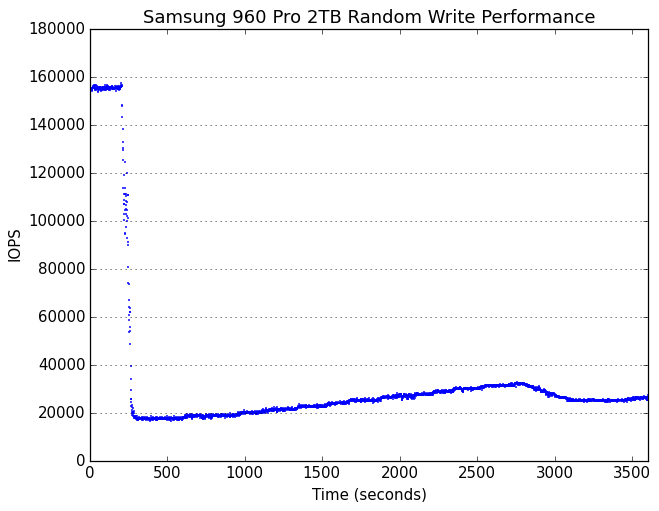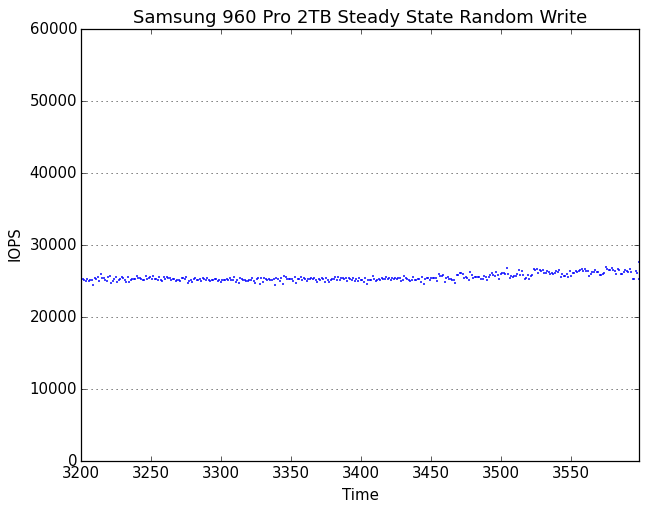The Samsung 960 Pro (2TB) SSD Review
by Billy Tallis on October 18, 2016 10:00 AM ESTPerformance Consistency
Our performance consistency test explores the extent to which a drive can reliably sustain performance during a long-duration random write test. Specifications for consumer drives typically list peak performance numbers only attainable in ideal conditions. The performance in a worst-case scenario can be drastically different as over the course of a long test drives can run out of spare area, have to start performing garbage collection, and sometimes even reach power or thermal limits.
In addition to an overall decline in performance, a long test can show patterns in how performance varies on shorter timescales. Some drives will exhibit very little variance in performance from second to second, while others will show massive drops in performance during each garbage collection cycle but otherwise maintain good performance, and others show constantly wide variance. If a drive periodically slows to hard drive levels of performance, it may feel slow to use even if its overall average performance is very high.
To maximally stress the drive's controller and force it to perform garbage collection and wear leveling, this test conducts 4kB random writes with a queue depth of 32. The drive is filled before the start of the test, and the test duration is one hour. Any spare area will be exhausted early in the test and by the end of the hour even the largest drives with the most overprovisioning will have reached a steady state. We use the last 400 seconds of the test to score the drive both on steady-state average writes per second and on its performance divided by the standard deviation.

The enterprise SSD heritage of the Intel SSD 750 continues to shine through as it holds on to the lead for steady-state random write performance, but Samsung has mostly caught up with the 960 Pro. This is a huge change from the 950 Pro, which had steady-state performance that was no better than typical SATA SSDs. A few consumer SSDs have offered great steady-state random write performance—most notably OCZ's drives based on the Indilinx Barefoot 3 controller—but the 960 Pro is the first one to reach the level of the Intel SSD 750.

In addition to mostly closing the performance gap, the 960 Pro has a great consistency score that is almost as good as the Intel SSD 750's score. While OCZ's Vector 180 offered remarkably high average performance in its steady state, it was far less consistent than the either the Samsung 960 Pro or the Intel SSD 750 and instead the standard deviation of its steady state performance was more than ten times greater.
 |
|||||||||
| Default | |||||||||
| 25% Over-Provisioning | |||||||||
After the initial period of very high performance, the 960 Pro enters a steady state with very good short-term consistency but gradual long-term variation in performance. This is more similar in character to the behavior of the Intel SSD 750 than Samsung's earlier SSDs, though it's interesting to note that the 960 Pro is more twice as fast during the initial phase before transitioning to steady state.
 |
|||||||||
| Default | |||||||||
| 25% Over-Provisioning | |||||||||
Focusing on the last 400 seconds of the test shows the 960 Pro's steady state to be essentially flawless, rounding out a full page of what can be considered to be perfect scores for a consumer drive. The performance would even make the 960 Pro a pretty good enterprise SSD, and this is usually not the case for drives with consumer-oriented firmware.










72 Comments
View All Comments
TheinsanegamerN - Tuesday, October 18, 2016 - link
Cant wait to see that, as it seems the 960 pro is thermally limited more often then not, especially on write tests. Hope to see even bigger improvements.eldakka - Wednesday, October 19, 2016 - link
But but but, since the controller is Polaris, doesn't the SSD handle your graphics too?I'll see myself out now.
BurntMyBacon - Wednesday, October 19, 2016 - link
@eldakkaNo. That would be Fiji. Though, I can see how it would be confusing. Even Ryan thought it was a Polaris 10 chip initially.
http://www.anandtech.com/show/10518/amd-announces-...
Waiting for a Polaris update to the Radeon Pro SSG. Throw some 960s (Polaris controllers) in to replace the 950s and things will get really confusing. ;')
VeauX - Tuesday, October 18, 2016 - link
Would migrating from an old Sandforce base SSD to this provide the same WOW effect than from mechanical to SSDs back in the days?GTRagnarok - Tuesday, October 18, 2016 - link
No, unless what you're doing involves reading or writing many gigabytes of data at a time in which case it'll be noticeably faster. Otherwise, the experience will be very similar compared to old SATA SSDs.AnnonymousCoward - Wednesday, October 19, 2016 - link
I have an absolutely brilliant idea. AT could just test that, and you wouldn't have to wonder and ask in the comments section!Mr Perfect - Tuesday, October 18, 2016 - link
This is kind of a chicken-and-the-egg problem, but has Samsung said anything about releasing these as U.2? Quite a few new motherboards have U.2 ports now, and putting these drives in the larger 2.5 inch form factor would make it possible to solve the overheating issues with heatsinks.Gigaplex - Tuesday, October 18, 2016 - link
It wouldn't be hard for a 3rd party to create a 2.5" adaptor that incorporates a heatsink.Mr Perfect - Wednesday, October 19, 2016 - link
You wouldn't think so, but I had a hell of a time finding one. All said and done, only one manufacturer seems to make an adapter to turn a M.2 into a U.2. Some company called microsatacables.com http://www.microsatacables.com/u2-sff8639-to-m2-pc...Some more native U.2 drives would be nice.
sircod - Tuesday, October 18, 2016 - link
Are you guys doing a review of the 600p? Not quite the same class as the 960 Pro, but I definitely want to see the 960 Evo compared to the 600p.